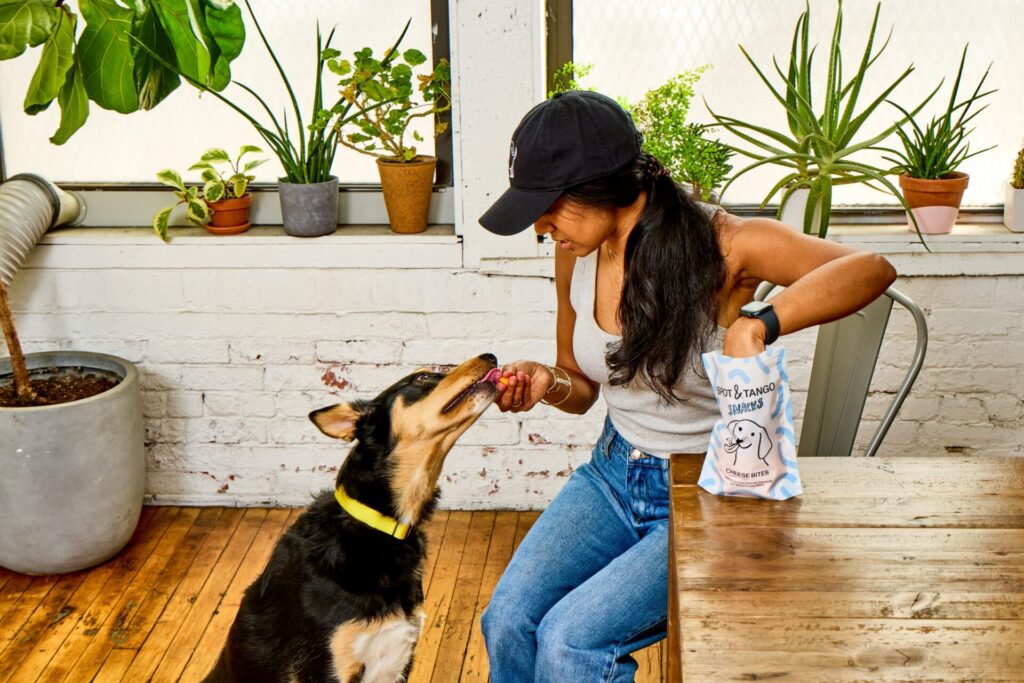As a dog parent, you’ve probably heard of the cheese tax. As soon as cheese comes out of the fridge, your furry friend’s little paws come running and their tail starts wagging, making it impossible to resist sharing a little piece. But is it safe for dogs to eat cheese? And if so, are there any real benefits of cheese for dogs (aside from the fact that they love it so much)?

Is It Safe for My Dog to Eat Cheese?
The short answer is yes, your dog can eat cheese! Majority of dogs can safely enjoy this treat as cheese for dogs is rich in protein, calcium, and healthy fats that can support your dog’s overall health. Cheese for dogs also serves as a high-value treat, making them perfect for training.
However, not all cheese is considered safe. Some have high amounts of salt, fat, or additives that aren’t suitable for dogs. Stick to cheeses like cheddar, parmesan, or Spot & Tango’s Cheese Bites! Additionally, it’s best to keep the gooey, cheesy dishes from your dinner table, such as pasta or pizza, for the humans only.

Benefits of Cheese for Dogs
1. Cheese is a high-quality protein for dogs.
Cheese is rich in protein, which helps your dog build and repair their muscles, skin, and other tissues. A bite of cheese can help give your dog a protein boost, especially if they’re training or have high activity levels.
2. Cheese is rich in essential nutrients.
Cheese contains a variety of nutrients that can support your dog’s health, including:
- Calcium: Essential for strong bones and teeth
- Vitamin A: Supports vision, immunity, and healthy skin
- Vitamin B12: Promotes red blood cell production and energy metabolism
- Riboflavin (Vitamin B2): Aids in energy production and helps maintain healthy skin and coat
3. Cheese can help with weight gain for dogs who need it.
For dogs who are underweight or recovering from sickness or surgery, cheese can serve as a treat to help increase caloric intake. This palatable snack can help your dog rebuild their muscles and support recovery. Additionally, cheese for dogs is energy-dense and can make food more enticing for picky eaters, ensuring your dog is getting the calories they need.
4. Cheese can help with medication compliance.
Ever struggle getting your dog to take their medication? We’ve got the oldest hack in the book: make pills more appetizing by pairing them with a bite of cheese! Most dog parents have seen successful results, and most dogs won’t even notice it.
5. Cheese is a fantastic training treat.
Many dogs find cheese irresistible, making it a powerful motivator during training sessions. Its soft texture and bold flavor make it easy to use in small amounts as a reward for good behavior.

How to Feed Cheese to Your Dog
Cheese for dogs can be a healthy treat, but serving it properly is key to avoiding potential issues. Here are our expert tips!
Stick to a plain, low-fat cheese: Mozzarella, cottage cheese, or cheddar are safe options for your dog to digest and are least likely to upset your dog’s tummy. Spot & Tango Cheese Bites are made of 100% cheddar cheese with no additives or preservatives, if you’re looking for an option made for dogs and with dogs in mind!
Avoid high-salt or high-fat cheeses: Feta, blue cheese, and cream cheese often contain high amounts of salt, fat, or molds. Also avoid cheese with additives like garlic, onion, or herbs.
Keep portion control in mind: Cheese is calorie-dense, so give your dog small pieces to avoid weight gain or upset stomachs. Cheese Bites are the perfect size with 3 kcal per treat!
Check if your dog is lactose intolerant: Some dogs’ digestive systems are unable to properly process dairy. If you’re giving your dog cheese for the first time, start with a small piece and monitor for diarrhea, gas, or vomiting.
Is Cheese Right for Your Dog?
Though most dogs would love for the cheese tax to be a real thing, cheese isn’t suitable for every dog. Dogs with obesity, pancreatitis, or dietary sensitivities should avoid cheese or only consume cheese under a vet’s supervision. And remember to always check in with your vet for advice if you’re unsure when adding new foods to your dog’s diet!




















